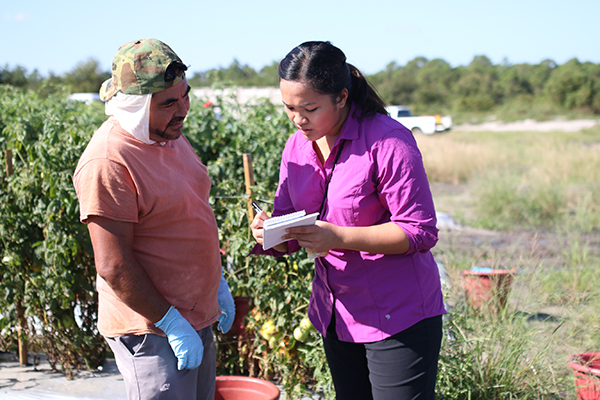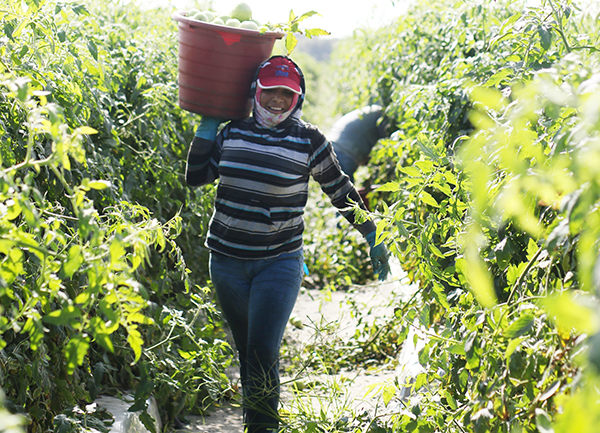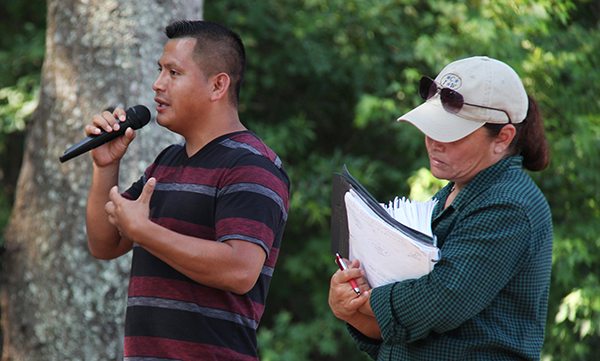
Worker-driven Social Responsibility (WSR) — the emerging paradigm for the protection of fundamental human rights in corporate supply chains born of the uniquely successful experience of the Fair Food Program — is founded on two distinct and equally important philosophical pillars: worker participation and an intense focus on enforcement. The former gives WSR its name and its ability to identify and uncover the abuses most urgently felt by workers themselves. The latter gives WSR its unrivaled power to eliminate those abuses.
This is the first in a two-part series about the lesser-known of those two pillars, the enforcement focus — indeed mandate — of the WSR model. The first part will outline the essential mechanisms that make enforcement possible. The second will lay out recommendations for retail corporations that are serious about their responsibility to respect human rights in their suppliers’ operations as set forth in the “Protect, Respect, Remedy” framework of the United Nations’ Guiding Principles on business and human rights.
A car without an engine, a drive shaft, and four wheels is just an empty shell…
Just as we can all agree that certain things — cars, watches, and computers, for example — are defined by their component parts, Worker-driven Social Responsibility can be defined by a necessary set of mechanisms without which it would simply be impossible to effectively enforce any meaningful code of human rights standards.
The Fair Food Program proves that truly significant change can be accomplished when one applies the necessary remedial measures to the current system of agricultural production. There are of course many efforts under way that attempt to accomplish social change in the agricultural sector, but they are not all created equal. Only the FFP has succeeded in eliminating forced labor and sexual harassment on a large scale in fields from Florida to New Jersey, receiving a Presidential Medal in 2015 for its “extraordinary efforts in combatting modern-day slavery” and recognition from a special EEOC task force as a “radically different accountability mechanism” for its success in the fight against sexual harassment and racial discrimination. And only the FFP has been singled out by the UN as a promising model for use in low-wage environments around the world.

To what is the Fair Food Program’s unique success due? Standards are certainly a necessary element of any social accountability program, as all the actors in a supply chain need to know what is demanded (not just expected) of them. But standards without the means to enforce them are not sufficient. Indeed, simply put, without enforcement even the “highest bar” standards are little more than words on paper. This it true whether those standards are generated by a corporation, a government or a worker organization. The issue is not how well-meaning the author is but rather whether the mechanisms and capacity exist to enforce whatever standards are set forth.
Only a comprehensive regime of enforcement mechanisms can convert standards into real change. And in the words of the head of the UN’s Working Group on Business and Human Rights, it is the “smart mix” of enforcement tools employed by the FFP that has both engendered truly historic change and led the UN to believe the model can be effective in a variety of contexts in countries throughout the world.
The first necessary tool for accomplishing change is market consequences, or, as it is more commonly called in business circles when it comes to supply chain issues like food safety, the “power of the purchasing order.” Without the knowledge that failure to comply with articulated standards will cost them business, suppliers will always balk at making uncomfortable changes, no matter how necessary. If this were not true, they would have made those changes long ago. But this is just the first step. Mechanisms must be put in place that allow the purchaser to know, on a consistent and reliable basis, when it is necessary to utilize this powerful tool.
In order to provide its Participating Buyers with reliable information upon which to base their purchasing decisions, the Fair Food Program employs three essential transparency and enforcement mechanisms. All are necessary to accomplish real change. No matter how good any one of them might be, without all three success cannot be achieved.
Worker Education: The first of these mechanisms is worker education, which in the FFP is provided by other workers. If workers are not aware of their rights and responsibilities (whether provided by law or a code of standards), they cannot be active participants in protecting those rights. And without workers as an active part of the enforcement mechanism, it will always be difficult, and usually impossible, to marshal sufficient resources to monitor violations in the fields. As such, worker education is not only essential to gaining real time insight into workplace conditions, it creates an extremely economical multiplier that effectively deputizes tens of thousands of workers as frontline monitors of their own rights.

24/7 Complaint Investigation and Resolution Mechanism: A corollary to educating workers about their substantive rights is the need to provide a means by which workers can report violations of those rights. In the FFP, this is the Program’s 24/7 complaint resolution system, which is the FFP’s second indispensable transparency and enforcement mechanism.
Operated by the Fair Food Standards Council (FFSC) – the organization accountable for verifying Code compliance of suppliers – the FFP complaint system is, as it must be, accessible to workers without fear of retaliation. Otherwise, workers would quickly learn not to complain if they want to keep their jobs.
In addition, complaint resolutions must be fair and timely. The need for fair resolutions is self-evident, but timeliness is an often overlooked element of the success achieved by the FFP. Timely resolutions provide remedy to the complaining worker within a timeframe that matters for his or her individual employment. Given the migrant nature of the workforce in the fields, this is no small improvement over alternative avenues for redress, as justice sought through Department of Labor or Legal Services complaints is all too often so delayed as to be justice denied. But as importantly, timely resolutions provide relief that is visible to the rest of the workforce that was present when the violation occurred, thereby reinforcing the viability of the “new standards” and encouraging other workers to defend them.

The importance of an effective and efficient complaint mechanism cannot be overstated, as it creates what is essentially a live video feed from the workplace to the oversight agency, ensuring that those farm bosses who might violate their workers’ rights know that the chances of being caught doing so are high. Just as actual video surveillance deters theft in retail stores, a complaint mechanism prevents at least as much labor crime as it detects. With over 1,400 complaints filed and processed in the FFP since its inception five seasons ago, and with 80% of those resolved in well less than one month, it is fair to say that the complaint mechanism is the primary tool in the FFP’s “smart mix of tools” for identifying and eliminating bad actors and bad practices, allowing the Program to gradually but inexorably reform what was not long ago considered one of the most backward sectors in the entire US produce industry.
Deep-dive Audits: Finally, the Fair Food Program utilizes in-depth audits. This is the most common enforcement mechanism, used uniformly, and almost always exclusively, in other social responsibility efforts. Audits are necessary to uncover unwanted conduct that is invisible to individual workers, like tampering with minimum wage calculations where workers are paid by piece rate. They also provide an opportunity to talk to workers about their perceptions of the work environment, but that only yields meaningful results if, a) the workers know their rights, b) the workers trust the auditors, c) the workers otherwise feel safe in talking to the auditors, and d) the auditors talk to enough workers to reach conclusions that are statistically significant. (The FFSC interviews at least half of the workers present during its audits, well above standard auditing practice in the industry. This means that on larger farms, the number of workers interviewed can reach into the hundreds.)
All of these preconditions are met in the FFP, but study after study has shown that they are not present during the vast majority of audits in other social responsibility programs. But even best-practice audits like those conducted by the FFSC provide only a point-in-time snapshot of the workplace. This is particularly inadequate when auditing for labor conditions, which are subject to both rapid change and manipulation.
In summary…
To be effective, any social accountability program must employ 1) worker education about their rights and remedies, 2) a confidential, timely, retaliation-free complaint resolution mechanism, and 3) regular and thorough audits. And all of those mechanisms must be backed by the “power of the purchasing order.” If any of those is missing, real change will not happen.
In other words, if someone is trying to sell you a car without an engine, a drive shaft, and four wheels, it’s not a car, no matter what they say. The same holds for social responsibility. If someone is trying to sell you a program designed to protect workers’ rights and it doesn’t have worker education, an effective and efficient complaint system, deep audits, and — most of all — economic leverage to compel compliance with the standards it claims to uphold, it’s not a real human rights program.
That’s it for part one of this two-part series. Next up: What to do if you are a retail brand in the market for real social responsibility.
